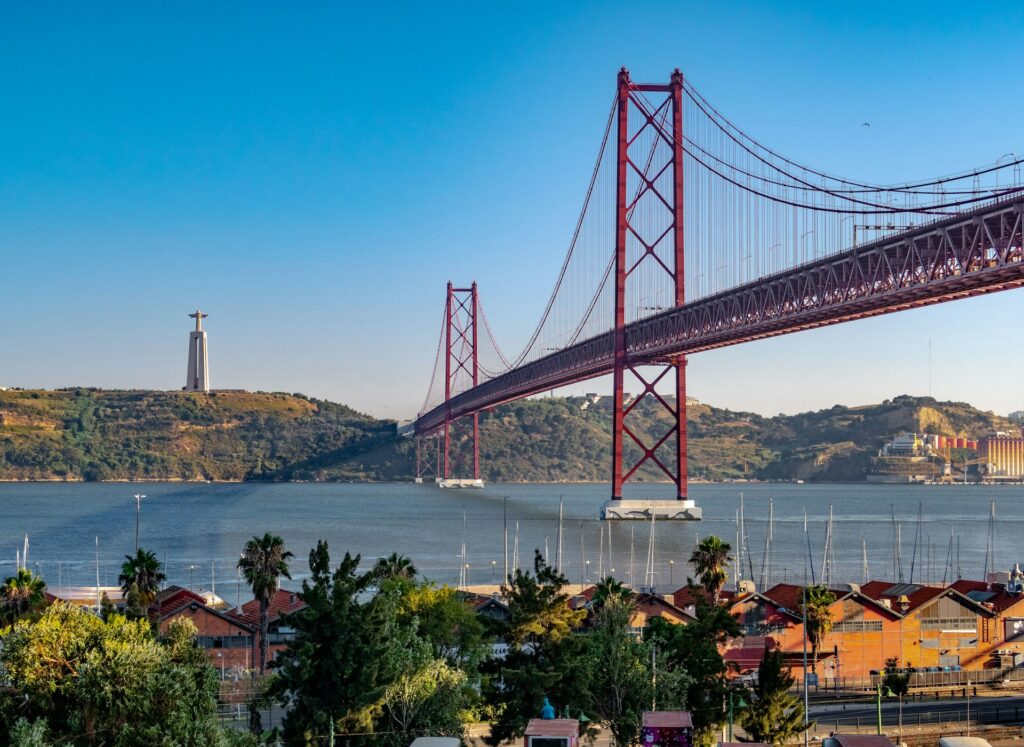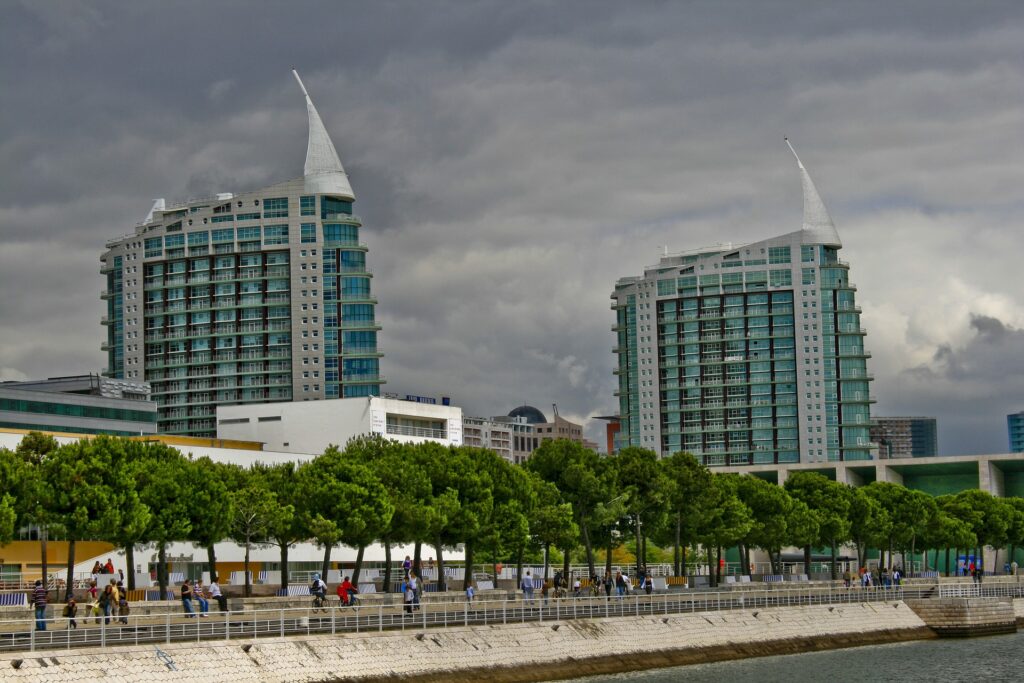Welcome to “Living in Lisbon: A Guide for Expats” – your comprehensive companion to navigating the vibrant life in Portugal’s capital. Lisbon, a city that effortlessly blends traditional charm with a buzzing modern lifestyle, offers a unique living experience that attracts expats from around the globe. Whether the allure of its historic neighborhoods, the promise of its sunny climate, or the vibrancy of its cultural scene draws you, Lisbon has something special for everyone.
What is the location of Lisbon?
Lisbon, the capital city of Portugal, holds a strategic and enchanting position along the western Iberian Peninsula on the Atlantic coast. Its unique location is where the Tagus River (Rio Tejo) meets the ocean, captivating visitors and residents for centuries. This geographical location not only defines its stunning waterfront but also contributes to its mild, temperate climate, making Lisbon one of Europe’s most livable cities.
Lisbon has recently been recognized as a top destination for travelers. According to an annual ranking by VisaGuide.World, Lisbon was named the best capital to visit in Europe, scoring an impressive 29.83 based on factors travelers value most.
Additionally, the Post Office Travel Money City Costs Barometer revealed that Lisbon is the best-value location for a European city break, solidifying its appeal for both budget-conscious tourists and those seeking a cultural getaway.
With its strategic position, Lisbon serves as the political, economic, and cultural heart of Portugal, making it an attractive destination for expats, tourists, and investors alike. Whether its scenic vistas, vibrant lifestyle, or economic opportunities draw you, Lisbon’s location blends history, natural beauty, and modern living in a unique way.

Best Neighborhoods in Lisbon
Lisbon, the vibrant capital of Portugal, organizes into 24 distinct parishes, each contributing its unique flavor and character to the city’s rich mosaic. This division into parishes, known locally as “freguesias,” facilitates local governance and community services, allowing for more tailored and effective management of urban and social services.
Chiado
Chiado stands as a sophisticated and lively district, nestled at the core of Lisbon’s artistic and cultural heartbeat. Renowned for its high-end shops, classical theaters, and an extensive selection of restaurants and cafes, Chiado epitomizes urban elegance.
Expats in Chiado immerse in the city’s artistic fervor, with regular art shows and live performances. This historically rich neighborhood showcases remnants from the 1755 earthquake and the renowned Bertrand Bookstore, among the world’s oldest.
However, living costs in Chiado are relatively high due to its prime location and cultural landmarks like São Carlos National Theater. Chiado’s superb public transport and vibrant nightlife bolster its appeal to expats seeking energetic urban living.
Principe Real
Príncipe Real, a fashionable Lisbon quarter, attracts expats with its cultural richness, contemporary flair, and relaxed vibe. Famous for its lush botanical gardens and lively Praça do Príncipe Real, hosting vibrant markets with handcrafted items and local delicacies.
For expats residing in Príncipe Real, the area offers a plethora of stylish boutiques, eateries, and bars, catering to those with a penchant for gastronomy and fashion.
Additionally, this neighborhood is recognized for its inclusive and LGBTQ+ welcoming environment. Príncipe Real seamlessly marries a modern city lifestyle with a warm sense of community, positioning itself as a preferred locale for expats desiring to integrate into Lisbon’s contemporary scene while feeling a deep connection to the community.
Campo de Ourique
Campo de Ourique is a family-friendly and residential neighborhood that appeals to expats seeking a quieter, more tranquil lifestyle. This district boasts tree-lined streets, cozy cafes, and Mercado de Campo de Ourique, offering delectable Portuguese cuisine.
Choosing Campo de Ourique means immersing yourself in a tight-knit community atmosphere where life unfolds at a leisurely rhythm, a contrast to the city’s more vibrant quarters.
The district is seamlessly integrated into Lisbon’s transport network, ensuring ease of access across the city. With a comprehensive array of facilities, from educational institutions to healthcare services, Campo de Ourique presents an appealing choice for expat families and those looking for a calm, connected place to call home.
Alvalade
Alvalade, serene and mostly residential, features lush, tree-lined landscapes and a strong sense of community. It appeals to expats desiring to immerse themselves in a traditional Portuguese lifestyle, augmented with the benefits of contemporary amenities.
Parks like Parque de Alvalade and Jardim do Campo Grande offer abundant outdoor activities and leisure options in the neighborhood. The locality’s efficient public transport network facilitates swift access to Lisbon’s heart and its various quarters.
Though quieter than Lisbon’s more lively central neighborhoods, Alvalade’s tranquil, family-friendly setting makes it an ideal choice for expats seeking a secure and inviting atmosphere for their new home.
Parque das Nações
Parque das Nações emerges as a sleek, forward-looking district, conceived from the remnants of the 1998 World Expo. It encapsulates a cutting-edge urban experience, underscored by its commitment to sustainability, leisure, and business.
Expats will find its striking contemporary architecture, picturesque riverside setting, and expansive Vasco da Gama shopping complex appealing.
The area boasts green spaces, gardens, and cultural hubs, such as the Oceanarium, one of Europe’s largest indoor aquariums.
Parque das Nações offers upscale living, perfect for those seeking energetic and modern urban lifestyles.

Top reasons why Lisbon is a good place to live
Living in Lisbon offers a myriad of advantages that attract people from all over the world, especially EU citizens who can easily settle here thanks to the freedom of movement within the European Union. Here are the top reasons why Lisbon is a fantastic place to live:
Climate and Culture
Lisbon’s appeal lies in its mild Mediterranean climate, with over 300 days of sunshine annually, encouraging outdoor living year-round. Complementing the pleasant weather is Lisbon’s rich cultural heritage, with historic neighborhoods like Alfama and Belém, and landmarks such as the Jerónimos Monastery and the Tower of Belém, offering a deep dive into centuries of history. The city’s vibrant arts and music scene further enriches this cultural tapestry, with galleries, theaters, and live music venues that celebrate everything from traditional fado to contemporary art and music.
Community and Quality of Life
Lisbon’s high quality of life, safety, healthcare system, and relaxed lifestyle make it a top contender on global livability indexes. According to Numbeo’s 2024 Healthcare Index by Country, Portugal’s healthcare system ranks 21st globally, highlighting the country’s dedication to providing excellent medical care, which further enhances Lisbon’s appeal.
Adding to its charm, Portuguese cuisine has been voted the fourth best in the world, according to audience votes collected by the food website TasteAtlas. The warmth and welcoming nature of the locals, alongside a thriving expat community, creates a supportive and inclusive atmosphere, where newcomers feel a strong sense of belonging. This is further complemented by the city’s vibrant food scene, where traditional Portuguese cuisine and innovative dining options come together, showcasing Lisbon’s impressive culinary prowess.
Affordability and Strategic Location
Despite its many attractions, Lisbon remains more affordable than many Western European capitals, offering a cost-effective yet high-quality lifestyle. This affordability, combined with Lisbon’s strategic location on the western edge of Europe, makes it a perfect base for those keen to explore nearby countries or even distant continents, underscoring the city’s appeal to adventurers and travelers.
Outdoor Lifestyle
Lisbon’s unique location, nestled between the sea and hills, offers a rich variety of outdoor and recreational activities. Golf enthusiasts will find world-class courses just a short drive away, such as those in Cascais, Sintra, and the Estoril Coast, surrounded by stunning landscapes.
For sailing lovers, the proximity to the Tagus River and the Atlantic Ocean provides excellent conditions for sailing, whether leisurely or competitive. The coast is dotted with marinas, making it easy to enjoy the sea. Whether it’s golf, sailing, water sports, or hiking, Lisbon’s natural beauty and diverse terrain cater to every outdoor passion.
Residence Permits and Visas to live in Lisbon
Whether you’re a non-EU national seeking to immerse yourself in the vibrant culture and sunny climate of Portugal’s capital, or an EU national looking forward to a seamless transition into Lisbon’s laid-back lifestyle, understanding the various pathways to legal residency is key.
Living in Lisbon as an EU national
If you are an EU national and intend to live in Lisbon for more than three months, the process is very easy and straightforward. You must apply for a Registration Certificate (Certificado de Registo de Cidadão da União Europeia, CRUE) at the city hall of your residence area, which costs €15. The certificate is valid for up to five years, after which it needs to be renewed.
Living in Lisbon as a non-EU national
If you are a non-EU national planning to reside in Lisbon, you must apply for a Portuguese residency visa before your arrival. Upon entering the country, you will be required to obtain a residence permit. There are multiple pathways for non-EU citizens to secure residency in Portugal, such as the D3 Visa and Work Visa. Below, you will find the most relevant options.
D7 Visa Portugal
Portugal D7 Visa, which is perfect for retirees or those with passive income. This visa requires proof of regular income or savings, and the ability to support yourself without working in Portugal. It’s a great option for those looking to enjoy the country’s relaxed lifestyle and stunning natural beauty.
Digital Nomad Visa
Digital Nomad Visa Portugal, or D8 Visa, for remote workers and freelancers allow them to live and work in the country for up to a year, enjoying all the benefits of the Portuguese lifestyle while earning an income from their remote job or business.
Portugal D2 Visa
D2 Visa Portugal in case you are an entrepreneur looking to start or develop a business in Portugal, which allows you to obtain a residence permit for up to two years.
Portugal Golden Visa
The Portugal Golden Visa program in Portugal, also known as the Residence Permit by Investment Program, is an investment immigration program that grants residency and citizenship rights to foreign investors who make a significant economic contribution to the country.

Living in Lisbon Pros and Cons
Advantages of Living in Lisbon
Pleasant Climate: Lisbon boasts a mild, Mediterranean climate with plenty of sunshine throughout the year, ideal for outdoor activities and enjoying the city’s many beaches.
Rich Cultural Scene: The city is a hub for history, art, and music, offering an array of cultural attractions, festivals, and events that cater to diverse interests.
Affordable Living Costs: Compared to other Western European capitals, Lisbon presents a more affordable cost of living, particularly in terms of food, entertainment, and public transport.
Friendly Locals: The warmth and hospitality of the Portuguese people make it easier for expats to settle in and feel at home.
Good Quality of Life: Lisbon scores well in terms of quality of life, with a good healthcare system, safety, and a laid-back lifestyle that many expats and locals appreciate.
Disadvantages of Living in Lisbon
Rising Housing Costs: As Lisbon becomes increasingly popular, the cost of housing has risen, making it challenging for some to find affordable accommodation in preferred areas.
Language Barrier: While many locals speak English, navigating administrative tasks and legal processes can be difficult without a basic understanding of Portuguese.
Public Transportation Limitations: Although Lisbon has a reasonable public transportation system, it can be overcrowded, and some areas are not as well-served as others.
Job Market Competition: The job market can be competitive, especially for high-paying positions, and the average wages in Portugal are lower than in some other Western European countries.
Bureaucracy: Like many countries, Portugal has its share of bureaucratic procedures, which can be time-consuming and frustrating, particularly for newcomers dealing with residency or work permits.
Schools in Lisbon
Should you prefer an international educational environment, our guide offers detailed insights into the various international schools available in Lisbon. Below, you will find information on some of the most well-known international schools in the city, designed to cater to diverse educational needs and language backgrounds. This allows your children to continue their education in languages such as English, French, or German, among others, providing a seamless transition into their new surroundings.
Navigating in Lisbon
Traveling in Lisbon offers a delightful exploration of Portugal’s vibrant capital, a city that harmoniously blends traditional charm with contemporary allure. Here are some essential tips and highlights for navigating and enjoying Lisbon:
Getting Around
- Public Transportation: Lisbon’s public transport network is extensive and affordable. Utilize the metro, buses, trams (don’t miss the iconic Tram 28 for a scenic city tour), and elevators to navigate the city efficiently. The Viva Viagem card, a rechargeable ticket, can be used across these modes of transport.
- Walking: Many of Lisbon’s districts are best explored on foot. Prepare for the city’s famous hills by wearing comfortable shoes.
- Bike and Scooter Sharing: For shorter distances or exploring the waterfront, consider bike or electric scooter rentals available throughout the city.
Must-Visit Attractions
- Belém Tower and Jerónimos Monastery: These UNESCO World Heritage sites offer a glimpse into Portugal’s Age of Discoveries.
- Alfama District: Wander through the oldest quarter of Lisbon, known for its narrow streets, fado music, and the São Jorge Castle.
- LX Factory: A creative hub located in a former industrial complex, offering a mix of shops, cafes, and art spaces.
Culinary Experiences
- Pastéis de Belém: Don’t miss tasting the authentic Portuguese custard tart in Belém.
- Seafood: Lisbon’s proximity to the sea means you’ll find exquisite seafood restaurants, offering everything from grilled sardines to bacalhau (codfish).
- Mercado da Ribeira (Time Out Market): For a gastronomic tour under one roof, this market features food stalls from some of Lisbon’s best chefs.
Cultural Insights
- Fado Music: Experience the soulful sounds of fado in one of the traditional fado houses in neighborhoods like Alfama and Mouraria.
- Art and Museums: Explore contemporary art at the MAAT (Museum of Art, Architecture and Technology) or classical collections at the Calouste Gulbenkian Museum.

Cost of Living in Lisbon
The cost of living in Portugal is notably more affordable compared to other European capitals, offering a significant advantage for those relocating from countries like the US or UK. For example, rental prices in Lisbon are considerably lower than in cities such as London, Paris, or New York.
However, it’s important to note that while Lisbon offers an affordable lifestyle, especially in comparison to other capitals, it is still the most expensive city in Portugal for day-to-day living. This is especially true for housing and certain services within the city center. As you venture into more rural areas of Portugal, the cost of living decreases even further, allowing for an even more cost-efficient lifestyle.
How much do I need to live in Lisbon?
Based on information from Numbeo, the estimated monthly expenses for a family of four are approximately €2,589.4, excluding rent. For a single person, the estimated monthly costs amount to around €735.2, also not including rent.
How much does it cost to buy a property in Lisbon?
Based on the latest data from February 2024 on Idealista, which is the largest real estate portal in Portugal, the average asking price for buying property in Lisbon stands at €5,538 per square meter.
When considering the wider Metropolitan area of Lisbon, the price decreases to €3,987 per square meter. It’s important to note that the final price will always depend on the neighborhood you choose to live in.
How much does it cost to rent an apartment in Lisbon?
Securing an apartment in Lisbon can be quite challenging due to the market’s high demand and limited supply, making it a competitive landscape for potential renters. The city’s allure, driven by its rich history, vibrant culture, and scenic views, has led to a surplus of demand, especially in preferred neighborhoods.
Rental prices vary significantly depending on the location within the city, with areas closer to downtown and the Tagus River commanding higher prices. According to Number please see estimated monthly rental prices:
- Apartment (1 bedroom) in City Centre – €1,295
- Apartment (1 bedroom) Outside of Centre – €908
- Apartment (3 bedrooms) in City Centre – €2,481
- Apartment (3 bedrooms) Outside of Centre – €1,631
Groceries and Food
When it comes to groceries and food expenses, Lisbon is relatively affordable compared to other European cities. The city offers a wide range of options for shopping, from large supermarkets to local shops and traditional markets, providing plenty of choices for purchasing your monthly essentials. Here’s an estimation of some typical prices you might encounter:
Transportation
One of the most convenient methods to navigate Lisbon is through its public transportation system. The city boasts an excellent network that includes underground metro, buses, and trams, ensuring residents and visitors alike can easily move around. A monthly pass, offering unlimited access to all forms of public transport, is priced at €40, presenting a cost-effective option for regular commuters. Alternatively, for those who prefer flexibility, a one-way ticket costs €2.

Why to work with Portugal Residency Advisors?
Local Expertise
Our deep understanding of Portugal sets us apart. We focus exclusively on this vibrant country to offer in-depth and practical advice. By concentrating our expertise here, we ensure you receive the most detailed and relevant guidance.
Holistic Approach
Your journey, streamlined through one point of contact. We offer an all-encompassing service, guiding you from choosing the right visa to finding your perfect home and easing your transition.
Transparent Service
Our advice is tailored to your best interests, drawing on years of experience to save you both time and money. Our fees are straightforward and competitive, without any hidden costs or upselling.
Simple Process
Our innovative use of technology simplifies your involvement in the bureaucratic process. We understand the customer experience firsthand and are dedicated to making your journey as smooth as possible.
Frequently Asked Questions About Living in Lisbon
What is the cost of living in Lisbon?
Lisbon offers a relatively affordable cost of living compared to other major European cities. Expenses such as groceries, public transportation, and eating out are reasonably priced, though rent can vary significantly depending on the neighborhood. On average, a single person’s monthly costs, excluding rent, are around €735, and a family of four’s costs, excluding rent, are approximately €2,589.
How is the public transportation system in Lisbon?
Lisbon’s public transportation system is extensive and efficient, encompassing metro, buses, and trams. A monthly pass for unlimited access to all public transport is €40, while a one-way ticket is €2. The system provides convenient access to the entire city and surrounding areas.
What are the best neighborhoods to live in Lisbon?
Popular neighborhoods include Baixa, Chiado, and Príncipe Real for those looking to be in the heart of the city. For a more residential feel, consider areas like Campo de Ourique, Estrela, or Alvalade. The choice depends on your lifestyle preferences, with each neighborhood offering a unique blend of amenities, culture, and atmosphere.
How easy is it to find accommodation in Lisbon?
Finding accommodation can be competitive due to high demand, especially in popular areas. Starting your search online through platforms like Idealista or Sapo can be helpful. Consider employing a local real estate agent for more personalized assistance.
What is the healthcare system like in Lisbon?
Portugal has a high-quality public healthcare system that is accessible to residents, including expatriates who are registered. Private healthcare is also available and is commonly used for quicker access to specialists and services.
Can I get by with English in Lisbon?
Yes, English is widely spoken in Lisbon, especially in the tourism and service industries, as well as among the younger population. However, learning some basic Portuguese phrases is appreciated and can enhance your living experience.
What is the weather like in Lisbon?
Lisbon enjoys a Mediterranean climate, characterized by mild, rainy winters and warm, dry summers. The city is known for its ample sunshine, making it pleasant year-round.
Is Lisbon safe to live in?
Lisbon is considered safe for residents and visitors alike, with a relatively low crime rate compared to other major cities. However, as with any urban area, it’s wise to take standard safety precautions, especially at night and in less crowded areas.




